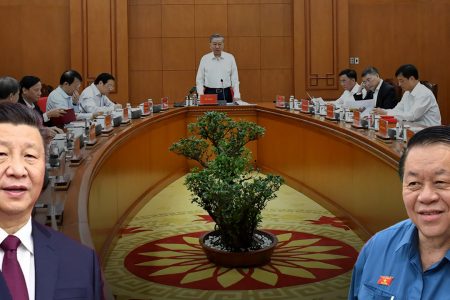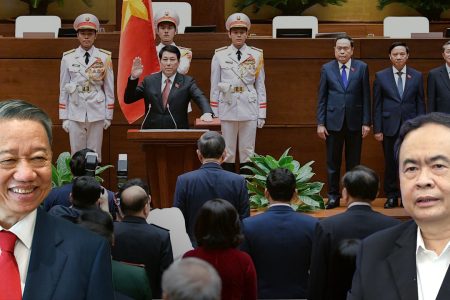Pham Chi Lan, a famous Vietnamese economist, former Secretary General and Vice President of the Vietnam Chamber of Commerce and Industry, once bitterly recounted that the World Bank’s experts have a joke about Vietnam, but it hurts to think.
They say: “In the world there are types: developed countries and slow-development countries, but Vietnam is a different country, a country that refuses to develop!”
Tell this story to see, Vietnam is a country of paradoxes. The story alone, Vietnam has more than 3,200 km of coastline, yet, each year it has to spend billions of dollars to import salt, which is an unbelievable example.
At the National Assembly session on the afternoon of August 15, National Assembly member Nguyen Anh Tri questioned the Minister of Agriculture and Rural Development Le Minh Hoan about why Vietnam must import salt. According to Communist Magazine, legislator Tri asked, “…why does Vietnam have to import about 600,000 tons of salt each year with a value of billions of dollars, while Vietnam has a coastline of several thousand kilometers?” At the same time, legislator Tri asked Minister Hoan to give specific solutions, what needs to be done so that Vietnam does not need to import table salt, so that salt farmers can live by their own salt production?
Answering the question, Minister Le Minh Hoan said that the traditional salt industry in Vietnam is currently facing many difficulties. The area of salt fields tends to shrink, because salt production is inefficient, because the price of salt is too low, so salt farmers quit their jobs.
Experts say that there are two problems that cause Vietnam to import salt. Firstly, at present, farmers in Vietnam still produce salt manually, in the traditional way. That is, making salt fields, putting sea water in, drying in the sun to evaporate, then raking the salt to sell. Second, the quality of Vietnam’s salt is not high, so the selling price is low. Moreover, salt prices are manipulated by traders so farmers left the salt field to work in the city as hired labors, easier and more secure.
According to statistics of the Ministry of Agriculture and Rural Development, Vietnam has a number of advantages in salt production such as: a long coastline and favorable natural conditions but due to fragmented and small production, there is a lack of industrial methods which led to low quality and productivity. Besides, low income causes salt production area to decrease to only 11,000 hectares by 2022, compared with 13,160 hectares in 2017.
To overcome the above situation, experts see that it is necessary to use new technologies, industrial production, to increase productivity and ensure quality. But with the situation, salt farmers have no capital to invest. Moreover, the price of salt is not very high, the investment will not be effective.
Public opinion believes that each Vietnamese leader, if he is responsible, must think about what Delegate Nguyen Anh Tri said to the National Assembly: “A country with sea like this, sunshine like this, experience like this, people make salt like this, but still have to import salt, I feel very heartbroken.”
It is one of the many paradoxes of Vietnam. However, for a long time, leaders of the Government, ministries and branches, did not pay attention to solving it. Then that situation lasted in vain, the salt farmers suffered even more.
However, the paradox does not occur exclusively with the salt industry, but similarly in Vietnam’s agricultural production, it is very difficult to break into the international market, because competitors are Thailand and China.
Another paradox for Vietnam’s agricultural product industry occurs in the domestic market. That is the situation, vegetables, tubers, and fruits cannot be sold, even farmers have to use their farm produce to feed the cows and imported agricultural products have increased rapidly.

According to the report of the General Department of Customs, in the last 8 months, Vietnam imported agricultural products worth $529 million, mainly from China and Thailand. The reason for that situation is that imported goods are cheaper and of better quality than Vietnamese agricultural products.
In a market economy, it is unreasonable for everything to require state protection. But the role of orientation and regulation, definitely must be the role of the state, no one can do it. Like Vietnam today, rice exports rank second in the world, but the country still has to import good quality rice from India or Cambodia, as an example.
In addition to the paradox of salt and agricultural products, Vietnam also faces many other paradoxes such as, being a coal producer but still having to import coal. According to state media announced on August 15, citing statistics from the General Department of Customs, in July 2023, Vietnam had to import nearly 30 million tons of coal, an increase of more than 10 million tons, compared to the same period last year. The average coal import turnover per year is estimated at more than $4.3 billion.
Dealing with the above-mentioned paradoxes not only requires the responsibility and wisdom of the leadership, but each Vietnamese citizen also needs to create a consciousness, “Vietnamese people use Vietnamese goods.“ That will help stimulate Vietnam’s economic development. More importantly, it is a way of showing patriotism of the Vietnamese people. Of course, this will become a reality, under the premise that Vietnamese goods must have the same quality as other countries’ goods.
Vu Anh (translated)




























